economists
Ralph Miliband
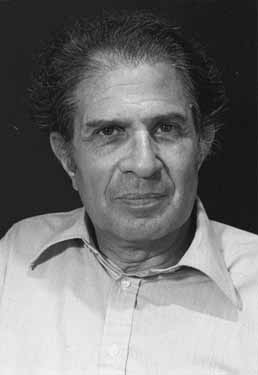
On this date in 1924, Adolphe Miliband, later known as Ralph Miliband, was born and raised in Brussels, Belgium. His parents were Polish Jews who migrated in the 1920s to Brussels, where they met and married. The Miliband family relocated to London in 1940, fleeing the Nazi invasion. In London he changed his first name to Ralph to avoid any connotation to Adolf Hitler. At age 16 he visited the grave of Karl Marx in London to swear allegiance to “the workers’ cause.”
Miliband studied at the London School of Economics under the historian and theorist Harold Laski, who greatly influenced Miliband’s politics. Miliband broke from his studies to serve in the Royal Navy and returned to the LSE to graduate in 1947. Miliband then earned a scholarship for Ph.D. research there, at which time Laski arranged for him to teach at Roosevelt College (now Roosevelt University) in Chicago. In 1949 he became a lecturer in political science at the LSE.
Miliband co-founded the New Reasoner and New Left Review, radical journals that represented the British New Left during the 1950s. Miliband began teaching at the University of Leeds in 1972 and spent time teaching at other universities in the U.S. and Canada. He argued after the mid-1960s that a better, more revolutionary alternative to the British Labour Party needed to be established. His promotion of a Marxist style of revolutionary socialism influenced generations of socialist scholars and leaders, including Tariq Ali.
Miliband married one of his former students, Marion Kozak, in 1961. They raised their two sons in a secular lifestyle. Ironically, Miliband, who critiqued the Labour Party in his book Parliamentary Socialism (1961), had sons who rose to great power in the Labour Party. Miliband was the author of The State in Capitalist Society (1969), Marxism and Politics (1977), Capitalist Democracy in Britain (1982), Class Power and State Power (1983), Divided Societies: Class Struggle in Contemporary Capitalism (1989) and Socialism for a Skeptical Age (1994). He is buried near Marx in Highgate Cemetery in north London. (D. 1994)
“The political climate in our house was generally and loosely left: it was unthinkable that a Jew, our sort of Jew, the artisan Jewish worker, self-employed, poor, Yiddish-speaking, unassimilated, non-religious, could be anything but socialistic.”
— Miliband, in a note for his unpublished autobiography, quoted in The New Statesman, “Ralph Miliband, father of the Labour leadership rivals David and Ed, is remembered as a great teacher” (Aug. 30, 2010)
Robert Louis Heilbroner
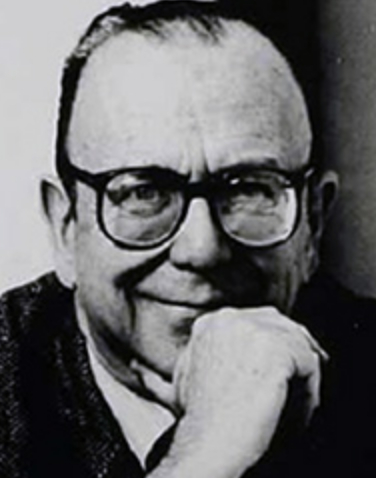
On this date in 1919, economist and social theorist Robert Louis Heilbroner was born into such a wealthy New York City family that he told the New York Post in 1972: “I was reared during the Great Depression and never knew there was one.” His German-Jewish father co-founded the men’s clothing retailer Weber & Heilbroner. He graduated summa cum laude from Harvard in 1940 with B.A.s in history, govenment and economics. His doctorate was earned from the New School of Social Research in 1963.
In 1972 the New School made Heilbroner, a nontheist, the first Norman Thomas Professor of Economics, named for the Socialist Party presidential candidate. Heilbroner served during World War II and was awarded a Bronze Star. The most famous of his 20 books on economics is The Worldly Philosophers: The Lives, Times, and Ideas of the Great Economic Thinkers (1953). Known for its inviting writing style and humanization of economics, the book has been translated into 20 languages, has sold 4 million copies and has been used extensively as a college textbook. He died of a stroke at age 85 in 2005.
What sort of religion will transform capitalism? A “statist” religion, says Heilbroner, that will elevate mankind’s “collective and communal destiny” and absolutely subordinate private interests to public requirements.
— New York Times review of Heilbroner's 1976 book "Business Civilization in Decline" (March 21, 1976)
Karl Marx
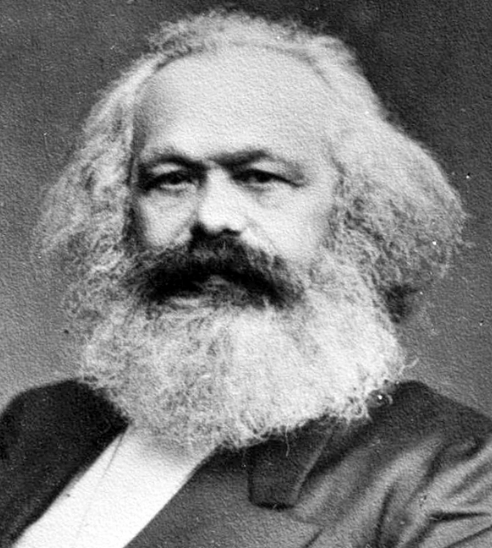
On this date in 1818, Karl Heinrich Marx, descended from a long line of rabbis, was born in the Prussian Rhineland. His father converted to Protestantism shortly before Marx’s birth. Educated at the Universities of Bonn, Jena and Berlin, Marx started writing for the German language, socialist newspaper Vorwärts! (Forward) in 1844 in Paris. After being expelled from France at the urging of the Prussian government, which “banished” him in absentia, he studied economics in Brussels.
He and Friedrich Engels founded the Communist League in 1847 and published the Communist Manifesto. After the failed revolution of 1848 in Germany, in which Marx participated, he eventually wound up in London. Marx worked as foreign correspondent for several U.S. publications. His Das Kapital came out in three volumes (1867, 1885 and 1894). He organized the International and helped found the Social Democratic Party of Germany.
Although Marx was an atheist, Bertrand Russell later remarked, “His belief that there is a cosmic force called Dialectical Materialism which governs human history independently of human volitions, is mere mythology.” (Portraits From Memory, 1956) Marx once quipped, “All I know is that I am not a Marxist.” (According to Engels in a letter to C. Schmidt; Who’s Who in Hell by Warren Allen Smith)
He married German theater critic and political activist Jenny von Westphalen in 1843. They had seven children. Only three survived to adulthood. In poor health for much of his life, he died at age 64 in London, two years after his wife. (D. 1883)
PHOTO: Marx in 1875.
“Religion is the sigh of the oppressed creature, the feelings of a heartless world, just as it is the spirit of unspiritual conditions. It is the opium of the people.”
“The first requisite of the happiness of the people is the abolition of religion.”— Marx, "A Criticism of the Hegelian Philosophy of Right" (1844)
Adam Smith
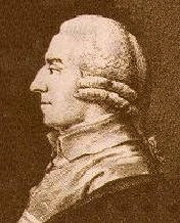
On this date in 1723, Adam Smith was born in Scotland. He was educated at Glasgow University, where he won an exhibition giving him a scholarship to Oxford on the condition that he become a minister of the Church of Scotland. A rationalist, he ignored the condition. Smith became chair of logic, then moral philosophy, at Glasgow University, where he sought unsuccessfully to discontinue classroom prayers and religious duties. He served as dean of the faculty from 1760-62, when he became vice rector.
He was on friendly terms with Glasgow’s elite freethinkers, including David Hume and deistic engineer James Watt. Smith’s Theory of the Moral Sentiment was published in 1759. As tutor to the young Duke of Buccleuch, he lived in France for a while, where he became friendly with Voltaire, Rousseau and the French Encyclopedists. In 1767 he joined the Royal Society. His master work, Inquiry into the Nature and Causes of the Wealth of Nations, was published in two volumes in 1776. The classic explanation of the free market was quickly translated into many other languages. In 1777, Smith’s Life of Hume came out, clearly endorsing Hume’s rationalist views.
After Smith became Lord Rector of Glasgow University in 1787, a position requiring that he bow to convention, he begged off aiding in the posthumous publication of Hume’s Dialogues on Natural Religion. Smith was said to have burned 16 volumes of his own manuscripts before his death. He advised, “Virtue is more to be feared than vice, because its excesses are not subject to the regulation of conscience.” During his lifetime, Smith made many anonymous acts of charity. D. 1790.
“Science is the great antidote to the poison of enthusiasm and superstition.”
— Smith, "The Wealth of Nations" (1776)
Barack Hussein Obama Sr.
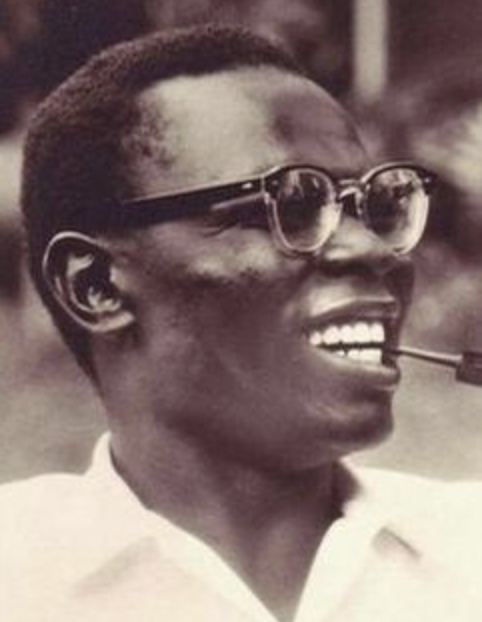
On this date in 1936, Barack Hussein Obama Sr., father of future president Barack Obama II, was born near Kendu Bay, Kenya, then a British colony. Obama studied at the University of Hawaii in Honolulu, earning a bachelor’s in economics in 1962. He’d met Ann Dunham on campus in 1960 and they married the next year after she became pregnant. President Obama was born to Dunham and Obama Sr. on Aug. 4, 1961, at Kapiolani Medical Center for Women and Children in Honolulu.
Obama Sr. first married in 1954 and had two children with his wife Kezia. President Obama has noted that his father was mostly absent from his childhood since his parents divorced when he was 2.
Obama earned a master’s in economics in 1965 from Harvard University. He returned to Kenya and ultimately became a senior economist in the Kenyan Ministry of Finance. He last saw Barack Obama II when he was 10. Altogether he had four wives and eight children.
The last years of his life were markedly difficult after he lost his government position due to conflicts with President Jomo Kenyatta. He’d lost both legs in an auto accident and died in another auto accident in Kenya at age 46. (D. 1982)
“ [A]lthough my father had been raised a Muslim, by the time he met my mother he was a confirmed atheist, thinking religion to be so much superstition.”
— President Barack Obama, Time magazine (Oct. 16, 2006)
Thorstein Veblen
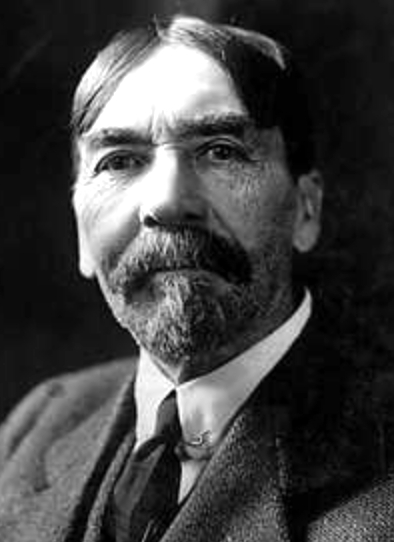
On this date in 1857, Thorstein Veblen was born on a farm in Valders, Wisconsin. Veblen conducted his undergrad studies at Carleton College, did post-graduate work at Johns Hopkins and earned his Ph.D. at Yale in 1884. He taught at a variety of schools, including the University of Chicago, Stanford and the University of Wisconsin. His book The Theory of the Leisure Class (1899) is the most famous of the nine he wrote. Many progressives, ranging from Charlotte Perkins Gilman to Margaret Sanger, were strongly influenced by it.
In it Veblen introduced the term “conspicuous consumption” and devoted a long chapter titled “Devout Observances” to deconstructing religion. Veblen also studied the place of science in civilization. While an evolutionist, he repudiated the unscientific application of evolution known as social Darwinism. Raised Lutheran, he was often denounced for his skepticism and was rejected when he applied for a teaching job at St. Olaf College, a Lutheran school in Minnesota. It has been averred that Veblen’s sole political act was to sign a petition urging Wisconsin Sen. Robert La Follette of the Progressive Party to run for president. (D. 1929)
“Indeed, it is becoming somewhat of a commonplace with observers of criminal life in European communities that the criminal and dissolute classes are, if anything, rather more devout, and more naïvely so, than the average of the population.”
— Veblen, "The Theory of the Leisure Class" (1899)
John Kenneth Galbraith
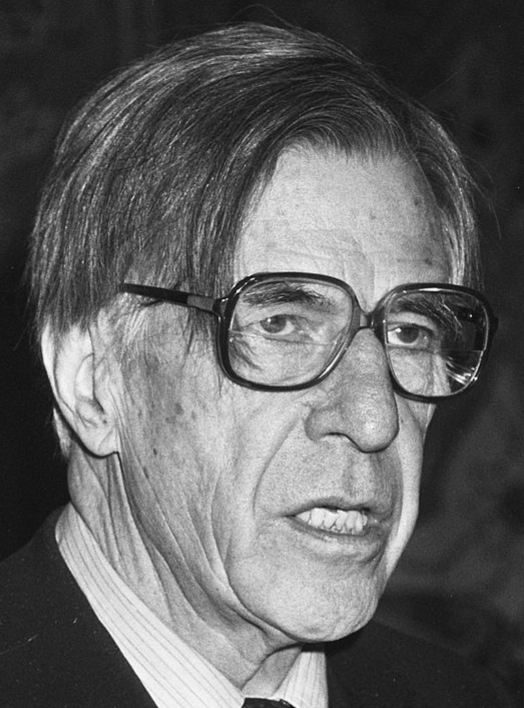
On this date in 1908, John Kenneth Galbraith was born in Iona Station, Ontario, Canada. He earned his B.S. at the University of Toronto in 1931 and his M.S. there in 1933. He received his doctorate at the University of California in 1934. Galbraith taught there and at Princeton before joining Harvard’s faculty. He was Paul M. Warburg Professor of Economics Emeritus at Harvard, where he retired in 1975.
His first best-seller was The Affluent Society, 1958, a warning about U.S. inattention to social welfare, which was followed by The New Industrial State (1967) and Economics and the Public Purpose (1973). His other books include many on economics, as well as Annals of an Abiding Liberal (1979) and A Life in Our Times (1981).
During World War II, Galbraith was in charge of wartime price control and was given the Medal of Freedom in 1946. A Democrat, he campaigned for Adlai Stevenson in 1952 and 1956, was ambassador to India for two years under John F. Kennedy and was an adviser and speechwriter to JFK, Eugene McCarthy and George McGovern. Galbraith was an early critic of the Vietnam War. He was married to Catherine Atwater and they had three sons. The American Humanist Association named Galbraith Humanist of the Year in 1985. He died at age 97 in Cambridge, Mass. (D. 2006)
PHOTO: Galbraith in 1982. Dutch National Archives photo.
“I have managed most of my life to exclude religious speculation from my mode of thought. I’ve found that, on the whole, it adds very little to economics.”
— Galbraith, "What I've Learned," Esquire magazine (January 2002)
Friedrich Engels
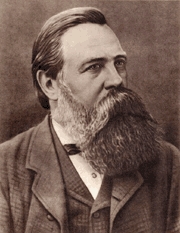
On this date in 1820, Friedrich Engels was born in Germany into a wealthy family. Managing a branch of his father’s business in Manchester, England, from 1842-1845, Engels became appalled at the poverty of the workers. He wrote his first socialist work, Conditions of the Working Class in England. After their meeting in 1844, Engels and Karl Marx became lifelong colleagues. While co-writing an article with Engels called “The Holy Family,” Marx was expelled from France at Prussian insistence. Engels followed him to Belgium. They founded the Communist League in London in 1846 and co-wrote The Communist Manifesto.
A month after it was published in 1848, Marx was expelled from Belgium. Engels became a primary financial supporter of the Marx family, returning to work in Germany with his father while Marx lived in England. Prime Minister John Russell had refused to expel Marx or Engels on principles of freedom of thought. Engels’ books include Origin of the Family, Private Property and the State. After Marx’s death in 1883, Engels edited and translated his writings. According to freethought encyclopedist Joseph McCabe, Engels’ acquaintance, Belfort Bax, called him “the devout Atheist” (A Biographical Dictionary of Modern Rationalists)
But according to a letter Engels wrote late in life to former classmates, he said, “The Hegelian idea of God has already become mine, and thus I am joining the ranks of the modern pantheists.” (The Frock-Coated Communist: The Revolutionary Life of Friedrich Engels by Tristam Hunt, 2009)
He died in London at age 74 of throat cancer, with his ashes scattered into the English Channel. (D. 1895)
